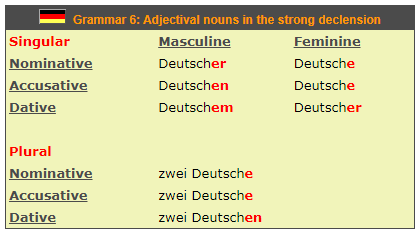
Notes
1. In practice the singular of the strong declension is rarely used.
2. The following examples shos how the strong declension of adjectival nouns is used in different contexts:
Viele Reisende brauchen Businesszimmer.
(Many travellers require business rooms.)
Wir fahren mit drei Gefangenen.
(We're travelling with three prisoners)
Fremde haben keinen Zutritt.
(No access for strangers!)
Adjectives with adjectival nouns
When adjectival nouns are preceded by adjectives, these adjectives - logically enough - have the same endings as the adjectival nouns. For example:
Wir helfen den kalten Überlebenden.
(We are helping the cold survivors.)
Ein alter Bekannter von mir spielt auch Squash.
(An old friend of mine also plays squash.)
Junge Erwachsene haben oft viele Probleme.
(Young adults often have a lot of problems.)
Ich fahre zu meiner französischen Verlobten.
(I'm travelling to my French fiancée's house.)
Neuter adjectival nouns
Adjectival nouns that refer to things or abstract concepts are neuter. We have met only one of these so far - "das Grüne", which can means "green" but also means "the countryside". It it is often used with the preposition "in" as in the examples below:
Unsere Pension befindet sich im Grünen.
(Our guest-house is in the countryside.)
Eure Verwandten fahren ins Grüne.
(Your relatives are going to the countryside.)
Wir bieten Suiten mit Blick ins Grüne.
(We offer suites which look out on the countryside.)
 英语
英语 日语
日语 韩语
韩语 法语
法语 西班牙语
西班牙语 意大利语
意大利语 阿拉伯语
阿拉伯语 葡萄牙语
葡萄牙语 越南语
越南语 俄语
俄语 芬兰语
芬兰语 泰语
泰语 丹麦语
丹麦语 对外汉语
对外汉语

